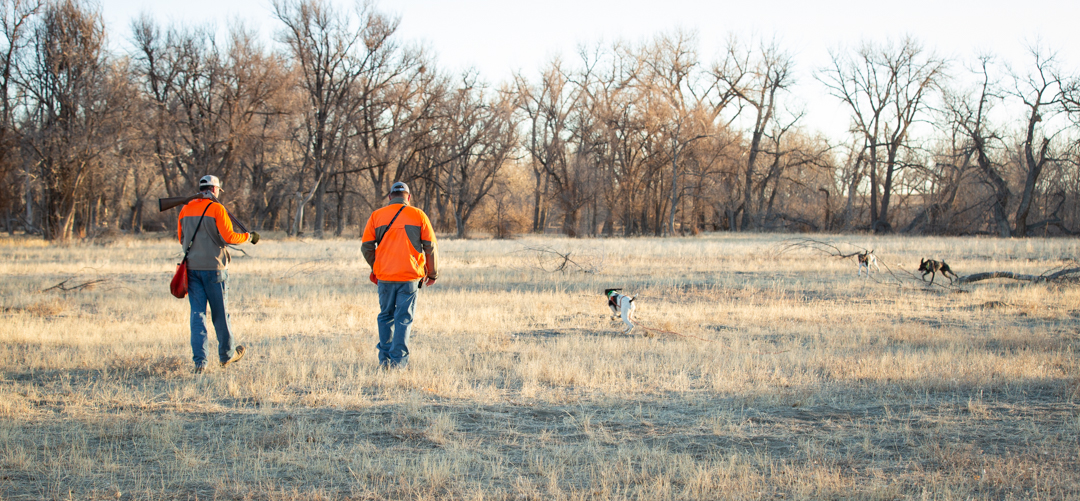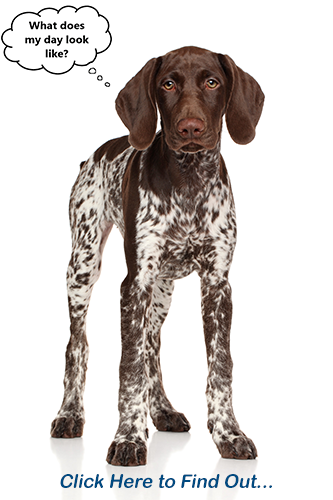
At Valhalla Kennels & Gun Dogs we want you to feel comfortable with the training that your gun dog receives. So we invite you to Meet Our Trainers and learn how they have used their training method become brilliant guides to your dog’s education through patience, a positive attitude, understanding and attention to detail. Our trainers want you to understand your dog, the different Training Levels and how they determine where your dog should be at in their training. Please check our Training Rates and Information and decide what best suits your needs. Valhalla also offers weekly gun dog training sessions for owners and dogs of all experience levels. The Gun Dog School of Excellence will quickly get both owners and gun dogs whipped into shape for the next bird hunt. If you would like to hear what others have had to say about the quality of training and the abilities of our trainers, please take a look at our Testimonials.
What are my training options?
Saturday Class
Our group class is held every Saturday morning starting at 8:00. This is also referred to as our puppy class but is more about a level of experience vs. age. Puppies as young as 16 weeks are encouraged to attend. Your dog will see and smell live birds, work quartering and retrieving drills, and will eventually be exposed to gun fire.
Private Training
This one on one experience is designed for those who want to be part of the entire training process and have time to devote to training and yard work. It’s also designed to work specifically on handling skills and developing you and your dog as a team in the field.
Gun Dog School of Excellence
This intense program requires dogs to check into the kennel for a minimum stay of 30 days. Training levels and goals determine the length of stay but this program has been turning out bird dogs of the highest caliber for over a decade.
Off Leash Training
This program gives dogs and owners the confidence and safety of being off leash. With control and recall at all times this program is a must for anyone or any breed that enjoys the outdoors and the freedom of having a good run.
Field Time
Field time available during your dog(s) stay
Training and/or exercise on Valhalla’s property for the price of $20/session.
* Birds can be added for a price of $20/bird
* A budget for field time can be set ahead of time
* Valhalla will provide all gear for Field time
- Rookie Training: Introduce your pup to the FUN of bird hunting!
- Seasoned Training: Furthering your gun dogs’ potential in the field!
- All Pro Training: For the experienced gun dog.
The key to a good bird dog is start early and start right.
Frequently Asked Questions
What Age should I start training my puppy?
We recommend starting puppies at 16 weeks of age. Training at the age is all about the fundamentals of field work and keeping things fun and developing drive. Key goals at this age are coming when called, quartering in the field on a check cord, actively searching scents in the field, and confidence in the field and social situations.
The average age to start more advanced training is 7-9 months old. This is when a dog is mature enough to handle more discipline and the repetitive training such as sit to the whistle or whoa work. This is also the age that a dog begins to test boundaries and their owner’s authority. Training at the age will determine the attitude and handling of your dog for years to follow.
Do you only train Bird Dogs?
We are known for developing world class bird dogs but we train all breeds. For obedience or off leash training we recommend working one on one with a trainer. Training the dog is 50% of our job and helping the owner become more confidant as a handler is the other 50%.
What does a day at Valhalla look like?
We have a staff that specializes in keeping bird dogs busy. We are well aware of the exercise requirements of our guests and make sure they are tired at the end of the day. We have climate controlled indoor enclosures and dogs have access at all times to their outdoor enclosures. Play groups are consistently being managed in the exercise yards. Training dogs spend their morning in the training fields and are shuttled back and forth to the kennel. Feeding begins around 4:00 and then another round of exercise in the play groups. Early evening the dogs are tucked in for the night and sleep sound until the trainers arrive bright and early to start all over again.
How involved should I be in the training process?
As a general rule the trainers like to have 2 solid weeks with your dog before you participate. This gives them a chance to develop a bond with the dog and the dog to focus 100% on the training process without distractions. After those 2 weeks, sessions with the trainers are by appointment only. Upon completion of the program it is crucial to spend time with the trainers to learn the commands and signals that the dog has been trained with. You will also learn how to correct negative behavior and handle your dog in the field. In most cases owners are welcome to visit their dogs anytime in the kennel but checking dogs out for weekends or disrupting the daily regimen of training is discouraged.
Who are our Clients?
Our customers want to bring out the best in their dogs. The training goals are unique to each dog but we work with clients that are committed to investing in their dog’s education and learning the appropriate handling skills. We can help all levels of training, from building a world class bird dog to having a well-trained running buddy.
How long is the training process?
The training process is broken up into 3 stages. As a general rule the stages take between 4-6 weeks to complete.
What if I’m not a hunter?
Sporting breeds are genetically designed to work and they need to be given a job. Even if you have no intentions of becoming a hunter spending time in the field is a great outlet for your dog’s energy and drive. Since obedience training is a natural by-product of the field training process you will also enjoy a more respectful and mature dog as a result.
What if I don't need to work with a professional trainer?
Valhalla offers training fields and access to birds for anyone interested in self training. Members receive discounted bird pricing and field fees are waived. Visit www.valhallahuntclub.com to reserve a field and for current pricing on training birds.
Puppy Q & A
What are some simple obedience training tips for when you get a new puppy?
We encourage owners of new pointer puppies to avoid teaching the sit command. This command can create bad habits in the field when formal “Whoa” breaking is started. When pressure is applied giving the Whoa command some dogs have a tendency to sit because sitting in the past has resulted in positive feedback. We also encourage owners of both pointing and retrieving breeds not to give squeaky toys to their puppies. Besides being obnoxious they can create a hard mouth and bad retrieving habits. Think about the air escaping from the lungs of a dead bird. It’s similar enough that dogs can equate dead birds with toys.
When is the appropriate time to introduce a new dog to birds?
Most well socialized and bold puppies can be introduced to live birds as young as 4 months old.
How do you make the first introduction of the dog to live birds?
The key to introducing live birds is to make sure the puppy is confident in its environment and that the bird is not in a position to scare or hurt the puppy. Usually pulling a couple flight feathers on a pigeon and letting a young puppy chase is the best way to introduce the first couple times. The goal is to develop drive and get excited about birds. As with any training exercise at a young age the sessions need to stay short and always end on a positive note.
Words of wisdom for the new bird dog owner?
The most important thing you can do when you bring a new puppy home is set boundaries. New puppies do not need full access to your house. Keep them in rooms that are easy to clean if they do have an accident. Teach them their place in the house. Our favorite trick is to have the puppy be part of the family by tethering them to a stationary object like a table or couch leg with a leash and having them lay on a dog bed. This teaches them where their place is in the home and lets them still be part of the family. They become confident on where they belong in the house and where their safe personal space is. Starting this habit as a young puppy has tremendous payoff for the rest of your dog’s life. Also, crate training is a must. Bird Dogs go on all kinds of adventures and the crate becomes a dog’s home base. A crate should be a comfortable and safe place where a dog goes to relax and sleep at the end of the day, it should never be thought of a a punishment.

